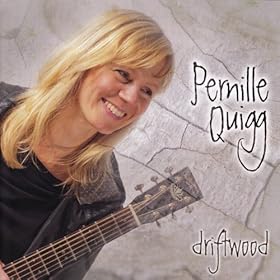|
Pernille Quigg, Driftwood (Lowland, 2013) On her first album Pernille Quigg, a Danish woman married to Scottish folksinger Stephen Quigg, delivers the old news. Driftwood feels as if dispatched through a time portal from 1963 to 2013, taking with it all that was worth preserving in the popular folk music of half a century ago. You wouldn't think this could be done as anything but a nostalgia exercise, but on Driftwood Quigg pulls it off. The album manages to seem as if perfectly at home in either, or any, year.
Driftwood recalls not only the music of the 1960s revival but its moral focus, with its humane spirit and left-liberal sentiment. Few songs from that time expressed those feelings more eloquently than Phil Ochs' "There But for Fortune," which Quigg revives in a particularly affecting reading. Hearing it decades after my initial listening, I am struck anew by its literal truth about the human condition -- we do indeed live at the sufferance of Fate -- and, even more profoundly, by its advocacy of compassion for those who have fallen through the cracks to life's other side. In our time, as powerful political figures promote policies indistinguishable from Social Darwinism, the song seems more radical than even Ochs intended it. Driftwood opens with another folk-era favorite, Malvina Reynolds's "Turn Around," which no parent with grown children will hear without a big lump in throat. Quigg tackles two songs from very different ages of exploration, the old ballad "Lord Franklin," about Sir John Franklin's doomed 1845 Arctic voyage, and the late John Stewart's "Armstrong," about the moon landing more than a century later. She also covers a couple of occupational songs, the Australian "Andy's Gone with Cattle" and the Scottish "The Shearing's No for You," and she offers up four melodic originals. There are 14 cuts in all. I like everything, but "Lord Yester" is one whose echoes I hear in my head even when I'm far from the CD player. Driftwood has the achingly spare sound of Quigg's guitar, buttressed on occasion by Ian McCalman's. Stephen Quigg provides some harmony vocals, and Hamish Bayne adds concertina on two numbers. A splendid job all around, making for a CD that will class up any collection. 
|
 Rambles.NET music review by Jerome Clark 11 January 2014 Agree? Disagree? Send us your opinions!  



 |

